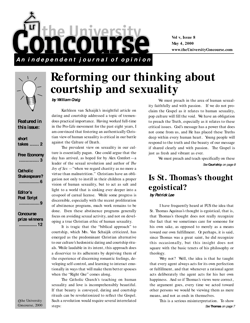Arrogant idealism
by Jason Negri
One of the biggest problems I have with Ben Brown’s articles is his assumption that his definition of a “liberal arts education,” of a “university” and (seemingly from his latest submission) a “truly Catholic vision” are the correct ones. While he is eloquent and passionate in defending his beliefs, he does so by pointing to things not yet agreed-upon.
Similarly, it would seem that many contributors take it for granted that Newman’s idea of a university is the proper model for FUS (and indeed any “true” university) to follow. Is it not possible that an alternate view of education, its ends and purposes, might be just as worthy of our consideration? St. Bonaventure, for example, held to a position that education was intended to be in service to man; that knowledge in one sense may be an end in itself, but that it was also a means to other ends? And would Ben Brown & co. see it as a betrayal or perhaps less “Catholic” if FUS would choose the Bonaventurian model over Newman’s?
His argumentative words to Professor Kelly were unwarranted, especially since Professor Kelly made no mention of Brown’s articles. Brown was simply using Kelly’s article as an occasion to restate his position, only this time it was particularly arrogant. For him to suggest that FUS should not call itself a university because we’re not living up to his (medieval) model is beyond the pale.
I, for one, appreciated Professor Kelly’s expression that FUS is trying to serve both needs (stronger liberal arts core and strong professional training), and his expression of support for their respective goods. His attempt to peacefully resolve this debate by recognizing the fact that the faculty and the University are even attempting to wrestle with this thorny issue was noble. It certainly did not deserve to be treated so disdainfully by Brown.
The core curriculum at FUS may indeed need improvement. I have no quarrel with those who advocate for a stronger liberal arts core for all students; as a matter of fact, I thank Ben Brown for his persuasive writing in past issues, as it has helped me arrive at the realization that I do support a stronger core. But there are important considerations that the faculty and the Core Curriculum Task Force must address. What I and others have tried to do in a hitherto congenial manner is to remind Concourse readers that these issues (professional, and indeed, life preparation for FUS students) are not ancillary issues—they are central to the debate. I think it’s irresponsible when these serious considerations are not sufficiently mentioned in the quest for a liberal arts ideal.
Jason Negri


